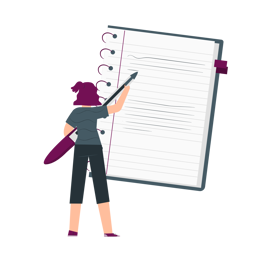Home > Blog > What AI Can Do for Behavioral Health Clinicians: The Future of Care
What AI Can Do for Behavioral Health Clinicians: The Future of Care
Author: Angela M. Doel, M.S., Psychotherapist
Have your progress notes written for you automatically
Artificial intelligence (AI) is rapidly transforming behavioral healthcare. For therapists, AI offers tools that support positive client outcomes, streamline administrative tasks, and create innovative treatment pathways. AI is a powerful ally to therapists, allowing them to focus on what they do best—delivering personalized, effective care to their clients.
Tailored Treatment Planning
AI technology offers incredible opportunities to create personalized treatment plans that are evidence-based and designed for each client's unique needs. AI can suggest the most effective therapeutic interventions for clients by analyzing extensive datasets and identifying trends and patterns. Here's how:
1. Predictive Analytics
AI can analyze patterns in a client’s history, symptoms, and treatment responses to predict which therapeutic methods are most likely to succeed.
- Example 1: Michele presents with symptoms of generalized anxiety disorder (GAD), and AI recommends Cognitive Behavioral Therapy (CBT) based on her tendency to ruminate.
- Example 2: Joe struggles with chronic pain and emotional avoidance, and he might find more significant benefits in Acceptance and Commitment Therapy (ACT), as AI pinpoints this match through symptom analysis.
- Example 3: Woebot Health and Replika use real-time client interactions to recommend mood-enhancing interventions or coping strategies that align with specific psychological trends observed in their data.
2. Adapting Plans in Real-Time
AI continuously monitors a client’s progress and provides insights to fine-tune treatment plans.
- Example: In a program for clients with depression, AI detects subtle changes in client-reported mood data from mobile apps and wearable devices. Based on evidence that these adjustments improve recovery rates, it could suggest switching from one intervention to another, such as augmenting CBT with mindfulness-based exercises.
3. Insights from Multiple Data Sources
AI systems synthesize information from diverse sources—therapy notes, psychometric assessments, physiological data from wearables, and genetic predispositions—to offer comprehensive treatment recommendations.
- Example 1: IBM Watson Health incorporates medical history, sleep data, and previous therapy outcomes to recommend interventions like Dialectical Behavior Therapy (DBT) for a client with emotional dysregulation or Eye Movement Desensitization and Reprocessing (EMDR) for trauma.
- Example 2: A therapist receives AI-driven suggestions about involving specific family members in therapy based on detected patterns of relational dynamics observed in session transcripts, assessments, and interaction questionnaires.
4. Client Engagement Through Feedback
AI-powered platforms engage clients by delivering highly personalized feedback and exercises designed for their goals.
- Example: BetterHelp’s AI Assistant recommends specific journaling prompts, meditative exercises, and psychoeducational content to help clients build resilience based on their evolving therapy needs.
5. Population Trends Applied to Individual Cases
AI leverages anonymized, aggregated data from similar cases to provide context-specific insights.
- Example: In addiction treatment, AI suggests approaches shown to be effective for a demographic with similar patterns, such as group therapy for social reinforcement in younger clients and personalized relapse prevention plans for older clients.
Therapists can enhance therapeutic effectiveness by ensuring that treatment plans are personalized and rooted in the latest evidence and real-time data.
Bridging the Gap Between Sessions
AI-powered tools for real-time monitoring provide clinicians with actionable insights and empower clients. These tools enhance therapy by delivering steady data and interventions that guide the client and therapist.
Smart devices like fitness trackers and smartwatches have sensors that monitor physiological markers linked to mental health, such as heart rate variability (HRV), sleep patterns, and activity levels.
- Example 1: Susan, diagnosed with obsessive-compulsive disorder (OCD), wears a smartwatch that tracks HRV. A sudden dip in variability indicates heightened stress levels, prompting the device to suggest relaxation exercises like deep breathing and progressive muscle relaxation.
- Example 2: Sam has bipolar disorder, and his wearable monitors sleep disruptions, a common early warning sign of mania. This data allows his psychiatrist to intervene proactively by adjusting medication and introducing sleep hygiene strategies.
Mobile applications leverage AI to engage users in ongoing mental health support, offering tools for self-monitoring, mood tracking, and personalized interventions.
- Example 1: Woebot uses natural language processing (NLP) to engage clients in conversations that help identify mood trends, offer psychoeducation, and deliver coping strategies tailored to the user’s emotional state.
- Example 2: Marisa has panic disorder, and she uses an app that detects signs of an impending panic attack through elevated heart rate and self-reported symptoms. It provides guided breathing exercises and grounding techniques in real time.
Real-time monitoring tools gather and analyze behavioral patterns, such as frequency of social interaction, exercise routines, and mood shifts.
- Example: Moodpath records mood entries and contextual factors (e.g., time of day, activity) to identify trends, such as worsening depression symptoms in the evening. The app suggests cognitive-behavioral techniques, and therapists use this data to explore triggers and make targeted adjustments to treatment plans.
AI tools provide early warning systems for mental health crises, empowering clients and therapists to act before situations escalate.
- Example 1: A wearable detects rising stress levels in Ana, a client with post-traumatic stress disorder (PTSD), during high-risk times (e.g., public events and trauma anniversaries). It sends a discreet notification with grounding exercises and instructions to contact her therapist.
- Example 2: Bart experiences suicidal ideation, and he uses an app that flags concerning patterns, such as withdrawal from activities and a sharp decline in mood entries. The app alerts his therapist, enabling swift outreach and intervention.
- Example 3: A therapist working with a client managing chronic stress reviews weekly data from a wearable showing consistently high-stress markers after work. The therapist prioritizes stress management training and work-life balance strategies in upcoming sessions.
AI-powered monitoring tools democratize mental health care, enabling clients to be more active in managing their well-being.
- Example 1: Apps like Headspace and Calm provide mindfulness exercises, empowering clients with anxiety to manage their symptoms between sessions.
- Example 2: For clients with ADHD, apps track task completion and send reminders, helping them establish consistent routines and reduce forgetfulness.
Enhanced Psychoeducation
AI delivers psychoeducational resources, helping clients understand their conditions and learn coping strategies.
- Chatbots provide interactive learning experiences, teaching clients about symptoms, triggers, and self-management techniques.
- Tools like Curio recommend articles, videos, or exercises based on a client’s needs and interests.
Streamline Administrative Tasks
One of the most time-consuming aspects of clinical practice is administrative tasks. AI is revolutionizing administrative tasks in mental health care, freeing therapists to focus on providing effective treatment and less on time-consuming clerical work. AI increases efficiency and accuracy across various tasks, from automated documentation to streamlining insurance claims.
AI-powered NLP tools significantly reduce the documentation burden by transcribing and summarizing therapy sessions in real-time.
- Example: Mentalyc automatically generates therapy notes from audio recordings or session summaries. Designed specifically for mental health professionals, Mentalyc creates comprehensive, well-structured notes that align with professional standards, saving therapists hours of administrative work each week.
Have Your Progress Notes Automatically Written For You!
✅ 100% HIPAA Compliant
✅ Insurance Compliant
✅Automated Treatment Plans
✅Template Builder
✅ SOAP, DAP, BIRP, EMDR, Intake Notes and More
✅ Individual, Couple, Child, Group, Family Therapy Types
✅ Recording, Dictation, Text & Upload Inputs
AI assistants automate appointment booking, send reminders, and reschedule sessions, creating a seamless scheduling process.
- Example 1: An AI-powered scheduling assistant integrates with a therapist’s calendar to automatically confirm availability, reducing back-and-forth client communication.
- Example 2: SimplePractice sends automated appointment reminders to clients via email or text, decreasing no-show rates and improving client retention.
AI streamlines complex billing and insurance claims processes, ensuring accuracy and minimizing delays.
- Example 1: AI systems automatically extract and populate required data from therapy notes and billing records, reducing errors and ensuring compliance with insurance requirements.
- Example 2: ZirMed uses AI to optimize claims processing, flagging potential errors or incomplete documentation before submission. This reduces the likelihood of claim denials and accelerates reimbursement timelines.
- Example 3: Dr. Johnson’s practice uses AI-powered tools for documentation, scheduling, and billing, and she sees a 30% reduction in administrative workload, freeing up valuable time for additional sessions and professional development.
By integrating AI tools like Mentalyc and other innovative platforms, mental health professionals can transform their practice operations, providing better care while reducing burnout and inefficiency.
Improving Accessibility
AI-powered tools are revolutionizing mental health care by making it more accessible to clients who face obstacles such as location, cost, or limited provider availability. Virtual therapy platforms, enhanced by AI, allow clients in remote or underserved areas to access high-quality care from the comfort of their homes. AI chatbots and self-help apps, like Woebot or Wysa, provide affordable or free mental health support, offering immediate assistance without needing appointments.
Language processing technologies translate therapeutic content and facilitate sessions in multiple languages, ensuring inclusivity for non-native speakers. By reducing costs and removing logistical hurdles, AI democratizes mental health care, ensuring more people receive the support they need.
- Example 1: AI-enhanced platforms like BetterHelp or Talkspace integrate tools like symptom tracking and chatbots to supplement therapy.
- Example 2: AI-driven hotlines triage calls, identifying those at immediate risk and ensuring they receive timely support.
The Benefits for Therapists
Adopting AI offers several advantages for behavioral health clinicians:
- Greater Efficiency. By automating routine tasks, AI allows therapists to focus more on client care, reducing burnout and improving the quality of therapy.
- Data-Driven Insights. AI provides actionable insights from data that would otherwise be too complex or time-consuming to analyze.
- Improved Therapeutic Alliance. With AI handling administrative tasks and providing supplementary support, therapists can dedicate more time to building client trust and rapport.
- Better Outcomes. Personalized care based on predictive analytics and real-time monitoring increases the likelihood of positive outcomes.
Examples of AI in Action
Treating Anxiety Disorders. Jack has social anxiety and uses an AI-powered app to practice exposure therapy between sessions. The app uses NLP to simulate realistic social scenarios, gradually increasing difficulty based on Jack’s progress. His therapist reviews the data to assess progress and adjust the in-session approach.
Supporting Clients with Depression. Jan struggles with negative thinking, and Woebot offers reframing exercises and mood tracking, giving her therapist insights into Jan's week before their next session.
Crisis Management. Davis experiences suicidal ideation and uses a crisis app that employs AI to recognize high-risk language, alerting his therapist immediately. This proactive approach saved Davis’ life.
ADHD Management. Barbi has ADHD and uses Akili Interactive to create personalized routines and gamified reminders, helping her stay organized and focused.
Family Psychoeducation. AI-generated resources help educate Donna’s family about her condition. AI created a customized guide explaining how to support her as she manages PTSD.
Preparing for the Future
To best utilize all that AI offers, therapists should:
- Educate Themselves: Stay informed about AI advancements through workshops, conferences, and professional literature.
- Start Small: Begin with one or two AI tools that address specific needs, such as scheduling or mood tracking.
- Collaborate: Work with interdisciplinary teams, including data scientists and IT professionals, to implement AI effectively.
- Advocate for Ethical Use: Engage in conversations about the ethical use of AI in mental health, ensuring that tools are equitable and client-centered.
The Human Touch in an AI World
While AI enhances the capabilities of behavioral health clinicians, it cannot replace the human connection central to psychotherapy. Empathy, intuition, and the therapeutic alliance remain irreplaceable. AI is a partner that supports therapists, freeing them to focus on the deeply human aspects of mental health care.
Conclusion
AI is revolutionizing behavioral health care, offering tools that improve client outcomes, reduce therapist burnout, and improve accessibility. By embracing AI thoughtfully and ethically, therapists can provide more personalized, effective care while preserving the human connection that’s at the heart of their clinical work. The future of behavioral health is not about replacing therapists with machines; it’s about empowering them with technology to serve their clients better.
References
- American Psychological Association. (2022). Artificial intelligence and its role in mental health care. Retrieved from www.apa.org
2. IBM Watson Health. (2023). AI applications in mental health. Retrieved from www.ibm.com
3. Woebot Labs. (2023). How AI chatbots are transforming mental health care. Retrieved from www.woebothealth.com
4. Akili Interactive. (2023). Gamified solutions for ADHD management. Retrieved from www.akiliinteractive.com
5. HIPAA Journal. (2022). Ensuring AI compliance with HIPAA regulations. Retrieved from www.hipaajournal.com
Disclaimer
All examples of mental health documentation are fictional and for informational purposes only.
Have your progress notes written for you automatically
See More Posts
Company
Product
Legal
Contact us
Who we serve
Psychotherapists
Join us







